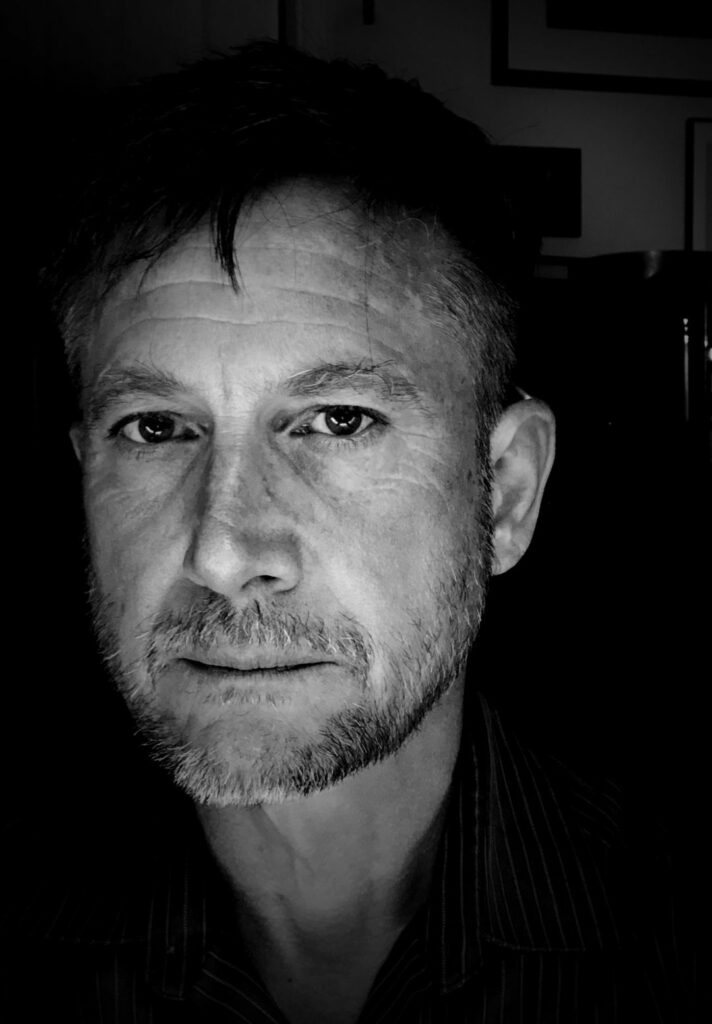
Testing out a new gizmo for portraits on my most patient model.
Overall I like how it looks. It’s a bone-simple setup; an Aputure 120D in a beauty dish above at about 45 ° with a Westcott Eyelighter reflector below. Shot on my iPhone 8 and tweaked in the ProCamera app.
Looking at this, I’m reminded of how I got the small scar on the tip of my nose.
Though I arrived just in time for my 23d birthday, 1989, and only spent four years there, I often tell people that I grew up in Japan. What I mean is not of course that I was a child there. But Japan is where I started making my first hesitant steps into leaving the semi-childhood of my early 20s and becoming an adult.
Fresh out of college with a BA in Japanese language and literature, I was trying like damn to become my hero Robert Frank. And then my other hero Sebastio Salgado. And then my other other hero Eugene Richards. And as far as aspiring to be someone else goes, those were pretty good choices. But I eventually came to understand that while I could never be one of these people, they could never be me.
Documentary photography demigod W. Eugene Smith described himself as ‘a compassionate cynic’ and I think he kind of nailed it. Any documentarian’s job is to look beneath the bandage, and try to understand and show the pain of the wound. Even and especially when it makes us question ourselves and our claim to morality.
At the time, the world was marveling at the astounding recovery Japan had made since the second world war. Our picture in the US was of a Japan that was homogenous and functioned like a precision machine. The truth is that Japan’s self-reinvention had, inevitably, come at a cost. Many were left behind, many did not fit, and the mandate to look toward the future had left many wounds from the war unhealed. Honestly I don’t think it could have happened any other way, everything has a cost, but I wanted to tell the story of the lonely and the defeated and the ones left behind like sea animals at low tide.
This brought me to Nishinari-ku (or Airin-cho depending on who you ask) in southern Osaka. The area was mostly populated by transient men who worked as day workers on construction sites. Alcoholism was more rule than exception and the combination of that with extreme poverty, boredom, and alienation made riots a regular occurrence.
Still convinced of my indestructibility I went there as tensions were simmering and was there that night when it turned into chaos. Riot troops in armor and the locals clashed and retreated in waves. Water cannons were used and I may have seen someone actually killed across the street from me (old man, frail like he was made of yellowing paper, got body slammed against a brick wall by a group of about a dozen cops in armor.; he was bleeding hard from the head when they dragged him off so…?)
I didn’t take any good photos. I was too scared of angering either side of the fight and my Nikon stayed under my jacket most of the time. But during one wave someone threw a glass bottle against a wall near me which detonated into tiny fragments flying in all directions. One of those fragments whizzed across my nose leaving the scar that’s still there. I was lucky. Very lucky. That piece of glass could just as easily gone straight through my left eye.
Then…
Within seconds I was surrounded by rioters who saw the blood on my face, all there to make sure I wasn’t badly hurt.. One, a man maybe 20, came forward and gently escorted me away from the fighting and toward the Tennoji train station. We passed a pharmacy where the owner was pulling down the steel shutter to close up for the evening, and he got the man to stay open for a few more minutes so I could buy a bandage. Then he got me within sight of the station and returned to fray. I don’t think I ever got his name.
I got on the train, rode the hour or so back to the company dormitory where I was living, and slept in a comfortable bed.
It’s an inconsequential injury, really a glorified shaving cut.
But it reminds me of how small I am.
Growing up is like shedding old skins because they don’t fit anymore. It’s not always pleasant. In fact it usually isn’t. I still look to this moment, and many others, as reminders of the incredible kindness I received in Japan that I really did nothing to earn. I like to think I’m wiser now.